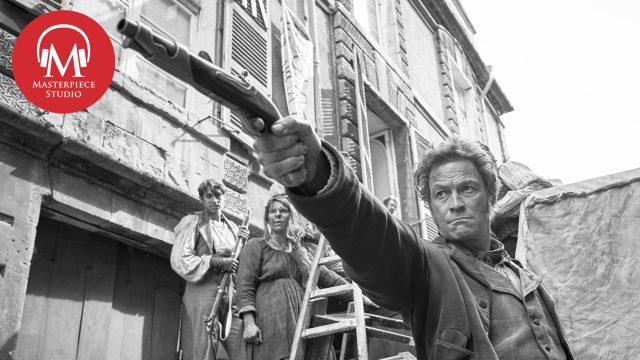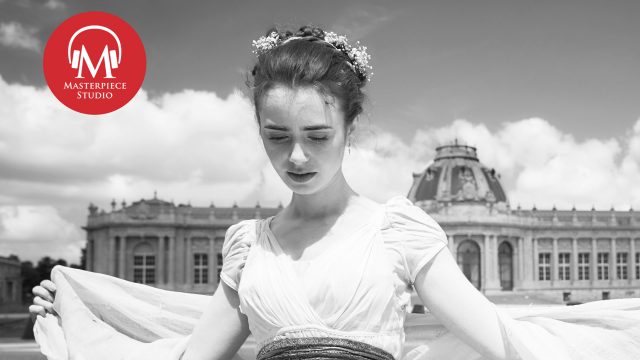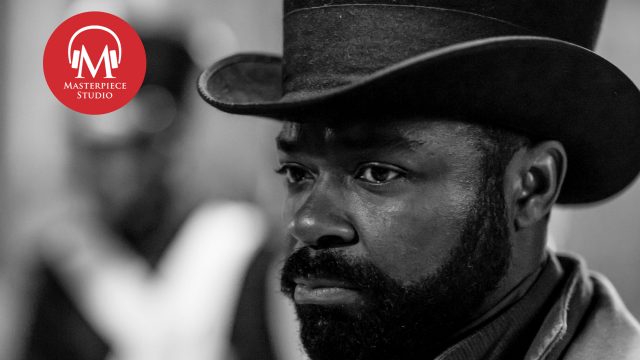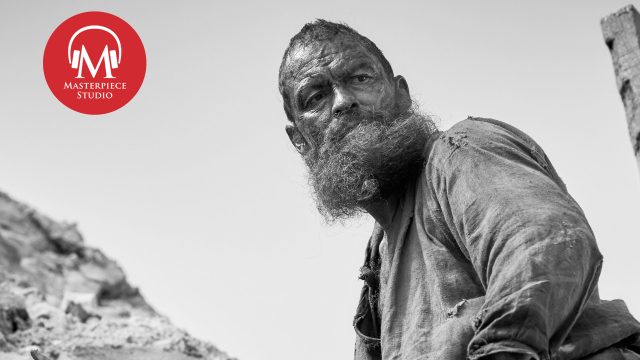Screenwriter Andrew Davies has been a true master of modern television adaptations, bringing such iconic works as Middlemarch and Little Dorrit to the MASTERPIECE screen for decades. Now, as he looks ahead to the end of his critically-acclaimed recent adaptation of Victor Hugo’s Les Misérables, Davies also previews his charming new adaptation of Jane Austen’s unfinished final novel, Sanditon, set to appear on MASTERPIECE in 2020.
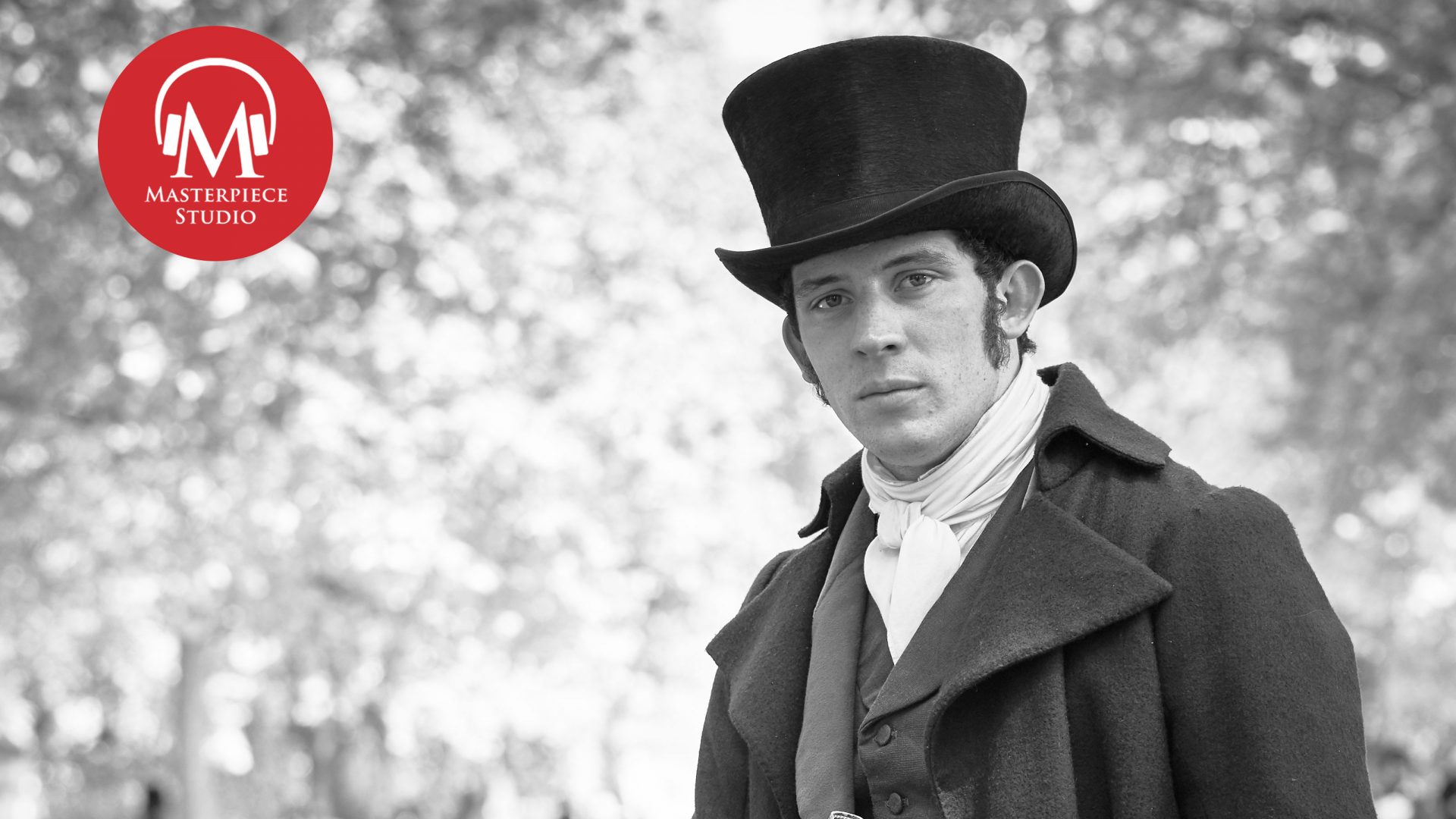

Andrew Davies Preps For The End Of One Series And The Beginning Of Another
Released 27:36
Related to: Les Misérables
Download and subscribe on: iTunes | Spotify| RadioPublic
Transcript
Jace Lacob: I’m Jace Lacob, and you’re listening to MASTERPIECE Studio.
This week on Les Misérables, ten more years have passed, and Valjean and a now-teenaged Cosette are living in a Parisian convent while Javert, now in charge of the capital city’s police force, continues to hunt his ever-elusive quarry.
CLIP
Cosette: What was my mother like?
Jean Valjean: Don’t make me speak of it. She was one of my workers and I dismissed her.
Cosette: What for?
Jean Valjean: For nothing, for concealing the truth.
Jace: Here to discuss the narrative time-jump and simmering political and personal tensions in Les Misérables is writer Andrew Davies. Davies has been one of the United Kingdom’s most prolific screenwriters, bringing his sumptuous adaptations of titles as varied as Middlemarch and Little Dorrit to MASTERPIECE for decades. Davies is already on the job for his next big MASTERPIECE series: a bold new adaptation and completion of Jane Austen’s tragically unfinished final novel, Sanditon. But with a few more episodes of Les Misérables to go, he offers a preview of the upcoming conclusion of his French revolutionary drama series.
Andrew Davies: Sometimes it’s the best not to kind of explain it to the audience just to say, you know, ‘Here it is. This moved and also baffled me. You know, let’s see what you make of it.’
Jace: Davies joins MASTERPIECE to talk Sanditon, the morals of Les Misérables, and his remarkable legacy as a true master of screenwriting.
And this week we are joined by Les Misérables writer Andrew Davies, welcome.
Andrew: Thank you.
Jace: What drew you to adapting Victor Hugo’s Les Misérables? And why is now the perfect time for such an adaptation of that specific book?
Andrew: It’s a big daunting kind of thing. And it probably wouldn’t be something that I’d have voluntarily just suggested to anybody. It’s not really my kind of book, in the sense that Jane Austen is my kind of author, because I’m reading it in translation. It’s great virtues are not to do with subtleties and wit. And, you know, the little varieties of human behavior. It’s a big kind of book. It reminds me of the Bible. You know, it’s so strong, it’s so iconic. It was suggested to me, and I read it, and I was kind of bowled over by the strength of it and also by the sonorities and the echoes of like the world we live in today. A divided society, certainly, as far as UK and France are concerned but you know, maybe America as well, in which there are there are the haves and the have-nots and this is a book predominantly about the have-nots. It seemed very apposite and contemporary to do this book now.
Jace: True or false: your tagline for the project was, ‘Nobody sings’?
Andrew: That’s true, yes. Yes, that’s right. We came across that quite early on.
Jace: You were quoted in The Telegraph as saying that this adaptation quote, ‘Will rescue Victor Hugo’s novel from the clutches of that awful music with its doggerel lyrics.’ Fans of the musical and some of its cast members were not pleased with your words. How do you react to their retorts?
Andrew: Well I mean, of course they were! I was very rude about the musical, but you know, you have to say what you think, don’t you? You have to be honest. I know a lot of people love the musical, but I thought it was a very feeble attempt to represent the novel. I completely accept that other people disagree with me. That’s the way it is it, isn’t it?
Jace: This version of Les Misérables sans singing gives us instead backstories of Fantine and Jean Valjean. We’re privy to very different aspects of these characters. A lighthearted romantic Fantine, a raging, almost feral Valjean.
CLIP
Jean Valjean: How could I not have a heart full of bitterness and hatred? I’d like to see you after nineteen years in the hulks! So don’t preach to me about God and love.
Bishop: I beg your pardon, forgive me, I should have considered your feelings.
Jace: Was it important to you to focus the first episode on these untold stories?
Andrew: Oh yes and I like the way you characterize Jean Valjean as raging, almost feral. Yes, sure. I think that’s that’s kind of where it comes from my first encounter with Les Misérables was when I was a little boy, I had a book called, Great Stories From the Classics, and it was little little petite extracts and it was a story of the Bishop’s candlesticks, and I thought, you know this poor Bishop, here comes this this terrifying figure who’s hardly human. He is so rough and so rude. And I found it quite hard to understand the behavior of the Bishop and also the behavior of Jean Valjean after the Bishop had been so kind. You know, I thought surely he should be terribly grateful. Instead he robs the Bishop and then the Bishop not only forgives him, but gives him more things. And that that that kind of puzzled me. But that I wanted to, I don’t know, preserve that sense of and it comes across in the book I think of how frightened people are of Valjean because he’s a man of extraordinary power and strength and he’s so resentful against society, because what society has done to him that I wanted to keep that frightening aspect of him. And that gets echoed later on in the story, when he takes Cosette out to see the dawn rising over the gates of Paris. It turns out that really he wants her to see the convicts.
CLIP
Cosette: Can they really be men?
Valjean: Yes, they are men. They are men like me. Cosette?
Cosette: I think if I crossed paths with one of those men, I would die. Just from looking him in the face.
Andrew: It’s so strange it’s not like it’s like kind of novels you normally read, is it? It’s like something it’s like a kind of solemn mystical religious tale, that’s more than a book. You know, you could live your life by this book, somehow.
Jace: You could. I mean, it’s about a monster who becomes a man, and a man who becomes a monster and sort of the inherent complexities of humanity therein. It’s interesting to me because we, we get a glimpse of Fantine. Traditionally we sort of picture her sort of a tragic sex worker. We get to see her entire backstory here. She’s given entirely new dimensions. Javert, however still remains a bit of a mystery. Did you consider filling in his backstory at all? I mean we get the fact that he was raised in a prison. But to see that additional dimension.
Andrew: Yeah. It would mean going too far back, too far back in flashback or whatever. Yeah, I could have done it. And one of those strange things that struck as somebody reminded me when we’d been developing the story for sometime, somebody said, ‘Valjean and Javert both seemed to be virgins,’ which is so extraordinary. You know, here are two mature men, and we don’t have any account of either of them having a loving relationship or a sexual relationship. Maybe sex is unimportant to Javert. And then having met Jean Valjean, he gets so annoyed with him that this develops into a kind of obsession, which is like a twisted love affair. And it’s like, Jean Valjean doesn’t seem interested in Javert at all, except as part of the forces that he’s fighting against. Once he gets out of prison, he never gives Javert another thought until Javert comes into his world and starts tormenting him.
CLIP
Rivette: That’s one man out of hundreds — and that was a decade ago. He may have been dead for years.
Javert: No, no, I am convinced that he is still alive and here in Paris, laughing at us. I shall never be at peace until he is back in chains.
Andrew: And one of the things I did in the adaptation I think was because I just couldn’t believe that coincidence that Javert would turn up and then having turned up that neither of them would recognise each other. I mean that’s the way Hugo has it in the story. I think well, actually it makes it much richer. If you think that Javert has heard about this guy and he thinks I’m beat it’s that guy I had in jail and I bet he’s been committing crimes all the time and I just want to see him again. And I want to trap him. I want to nail him. I want to get him in my power. And so then it becomes a situation where they both know, but neither of them is letting on. Yeah, Javert is just waiting for Jean Valjean to reveal himself.
Jace: You’ve become known as a master of adaptations. You once said it gave you ‘A wicked thrill’ to cut down War and Peace. Are there any sacred cows when it comes to adapting fiction?
Andrew: No, I don’t think so. But I’m aware that these great books are not called Great Books for nothing. I mean these guys knew what they were doing. So I do respect the excellence of the original. But having said that, an adaptation is my take on them. It’s not the definitive one, necessarily, but I think it’s my job and my duty to get my reading of a book, not just try to humbly prostrate myself before the Great Author.
Jace: Given that you’re adapting rather colossal tomes for the screen, how do you prioritize or decide what makes it in and what doesn’t?
Andrew: I do a thing at the beginning, after a first reading, or my most recent rereading if I’ve read it long ago in the past, ask myself, ‘What really is the story here? Whose story is it? Who do we love? Who do we need to keep at the forefront of our minds?’ And base the whole adaptation around those two questions.
Jace: And how much of that decision making is personal versus thinking about what the audience might want or need?
Andrew: Um, entirely personal. Obviously I’m concerned about the audience but the audience is something very amorphous. I think the first audience as being me. I want to write something that I would like to see and that I would enjoy seeing, and there is something that I think most people wouldn’t realize which is that the first people that see it the people the time working closely with and they’re three or four very clever, very sympathetic, very clued up young people who are decades and decades younger than me, and close behind pleasing myself, I want to please them. And I don’t think of the audience in general. I think when I’m writing it, ‘Have I got it right for myself?’ and then I think, ‘Oh Laura’s going to laugh at this, Will is going to be moved by that.’ So those thoughts are quite uppermost in my mind.
Jace: Before this next question, a quick word from our sponsors…
Jace: Now this week’s episode moves the action forward to 1832. We find a teenaged Cosette and Jean Valjean are still living at the convent. How did you decide where to place the time jump in the series? Was there always a notion that it would be at sort of a natural halfway point?
Andrew: I think Hugo himself helps us here, I mean he did this, we don’t get a lot of detail about how Cosette goes from age 6 or 7 to 16 or 17. We find her again a fully changed character, from being this abused little girl who’s clearly a survivor. And little Cosette is somebody who, when she’s shown love, reciprocates and she hasn’t been too damaged by all the abuse she’s suffered. And they have one of those almost idealized, perfect father daughter relationships. I invested a lot of emotion myself, I’m the father of a daughter. And there’s a brief period in the girl’s life when her father is just everything, and she falls in love with you. And and then she’s going to gradually, yeah change, and of course Jean Valjean who’s known no love in his life before, can’t bear it that this is going to change.
Jace: You mentioned briefly earlier about Javert happening onto Montreuil where Jean Valjean just happens to have set himself up. Les Misérables relies rather heavily on coincidence — Marius ends up in Valjean and Cosette’s old flat next to the Thenardiers, whom his father told him saved him during the war. Cosette that ends up with the doll made of her dead mother’s hair. Should these occurrences be read as coincidence or as providence?
Andrew: Well I think again, as I said before this is one of those books, it’s not like an ordinary book. I’ve tried to sort out or explain or get away from some of the coincidences, but I guess some of the things in the book you’ve just got to understand. We don’t know for definite that the doll is made out of her mother’s hair, but it might be, because it could be the same guy. I mean he goes around the country, ‘I’m buying and selling I’m selling and I’m buying.’ And the teeth and the hair the get redistributed again and again.
Jace: Marius meets Eponine, and she tries to tempt him through a peephole in the wall. His romantic attraction to Cosette is complicated by sexual desire for Eponine which culminates in a we’ll say vivid dream he has. What were your intentions with this scene and with Marius’s sense of guilt?
Andrew: Well I was just fascinated by by Eponine and her character and just her juxtaposition with Marius at this stage. In the book, Marius is just such a po faced puppet, really. And I wanted, you know, to make him more like a real young man who’s been, I mean. In a way, like like most of the kids in this book, he’s been abused. I mean his upbringing was ridiculously privileged but he’s been brought up as a kind of little fascist, really. And he’s worked out for himself with some prompting that some in his grandfather’s view is biased and crazy. And that he’s got to work out his own and things and of course here’s this here’s this girl who’s possibly a teenage prostitute. It’s never absolutely clear what she does, and she’s living next door and she likes him. And I just think it’s I always look if I can find any sources for humor in these these sort of grand, iconic books and the situation where he has this pure romantic love for Cosette, but there’s this girl next door who’s sort of tempting him physically, and so I couldn’t resist giving him an erotic dream about the wrong girl. He wants to have a dream about Cosette, which is all kind of pure and kissy-kissy. Instead he finds she’s she’s changed into Eponine, who has a more kind of direct and visceral appeal. I suppose for him though from Eponine’s point of view, Eponine has a kind of pure attraction for Marius. She just thinks he’s lovely and she’d do anything for him. I mean he’s he’s a you know a different kind of boy from the kind of boys she’s known.
Jace: There’s a massive fight sequence between Valjean and the Thenardiers and their criminal associates who ambush him, and ultimately Javert shows up as well.
CLIP
Valjean: You dare to threaten my Cosette? You think you can do anything to impress me? Look! Now do your worst!
Jace: How difficult was it to write this pivotal action sequence?
Andrew: I thought it was difficult because it’s so strange in the book. The most vivid thing in all this encounter, is that he allows himself to be overpowered and bound and then his superhuman strength is a given in the story. So he throws them all off, and proceeds to take this iron out of the fire and wound himself with it in order to demonstrate how puny any effort to frighten him about that kind of thing would be. So it’s again, it’s, you keep getting these things that are, you know, not rational and not logical and something like a kind of mystical text.
Jace: I mean it is craziest thing.
Andrew: That we need to reflect on and say, ‘Well what is that? What could that mean?’
Jace: That moment is the craziest of all the craziness. Because he does burn himself. It is a demonstration of sort of his strength and his fearsomeness and it sort of is that moment where he allows sort of the monster to come out that he’s been containing, it is sort of his true self. I mean, what were you trying to convey with that precise action?
Andrew: I was just trying to I don’t know, represent that episode in the book, I think. And it was something that I found you know very powerful and moving, but hard to understand. And sometimes, you know, it’s the best not to kind of explain it to the audience, just to say, ‘Yeah here it is. This moved and also baffled me. You know, let’s see what you make of it.’
Jace: We have an Andrew Davies adaptation of Jane Austen’s Sanditon on the horizon. Austen only wrote about 100 pages of that fragment. Was it challenging or liberating getting to finish an unfinished work of Jane Austen?
Andrew: Well it was, but it was both both challenging and liberating. It’s odd, it’s just a fragment, it’s quite a long fragment, I would imagine she would have ruthlessly edited the hundred or so pages that she wrote, because I find that there was enough for half the first episode, but that was all in her hundred pages. But she did get to introduce the characters and set out the situation and that was a really bold departure for Jane Austen, because the situation is the transformation of a little seaside village into a fashionable seaside resort like Brighton or somewhere like that. And the characters are again a departure. Of course, we’ve got our young heroine, who is a fairly typical Jane Austen heroine. She’s a bit like a rather more clued up version of Catherine Morland out of Northanger Abbey, she’s come from a large family of which she’s the oldest girl. So she’s quite sussed out about farm life and looking after her younger sisters. But she gets pushed into a new world with a lot of different people who are different from all the sorts of people that she’s known before. And crucially these main people, they’re not aristocrats or gentleman farmers, they are business people, they’re entrepreneurs. They want to make a new world and make themselves some money. And you know, that’s different from all of Jane Austen’s characters before and and so a lot of the novel is about things like raising money, attracting celebrities, trying to build momentum. How modern! And also it’s got Jane Austen’s first black character, who’s an heiress from the West Indies with a fortune. I’ve said it was a hundred thousand pounds, which is huge for those days but it makes it so, on the one hand, she will encounter of course a lot of prejudice because this an England seaside village, no one will ever seen a black person before. But on the other hand, whoever marries her is going to be set up for life. So that’s an interesting situation. And then you’ve got the local rich lady, who’s got lots of money that she might leave to this person or this person or this person. And so we’ve got several people who are after her money. And of course, an entrepreneurial family of brothers all need her money as an investment. And so we’ve got a wonderful situation I think to start a story, and it was very liberating to write it. And also I was very, very much in mind that this Regency period where it’s set. She set it, I think well, she was writing it in 1820, so I thought, let’s let’s go for 1820, which was late Regency period. A period of extreme kind of looseness in society, really, which was much more dissolute than actually than we’ve got today. Jane Austen knew all about that stuff, but she always kept it below the surface with discrete references. We’re not going to be so discreet.
Jace: I’d expect nothing less. Andrew Davies, thank you so very much.
Andrew: Thank you.
Jace: MASTERPIECE viewers already on the edge of their seats thanks to Season 3 of Unforgotten won’t want to miss next week’s podcast, where we go behind the scenes with this season’s horrific killer as DCI Cassie Stuart and DI Sunny Khan catch their prey.
CLIP
Sunny: The ticket was issued at 6:20 a.m, on the A-405.
Cassie: Which is where?
Sunny: About six miles outside Middenham.
Cassie: And was he heading to, or from?
Sunny: From.
Jace: That’s next Sunday, May 12, following the explosive third season finale of Unforgotten.
MASTERPIECE Studio is hosted by me, Jace Lacob and produced by Nick Andersen. Elisheba Ittoop is our editor. Susanne Simpson is our executive producer. The executive producer of MASTERPIECE is Rebecca Eaton.
Les Misérables Podcasts 4 More Podcasts
MASTERPIECE Newsletter
Sign up to get the latest news on your favorite dramas and mysteries, as well as exclusive content, video, sweepstakes and more.











